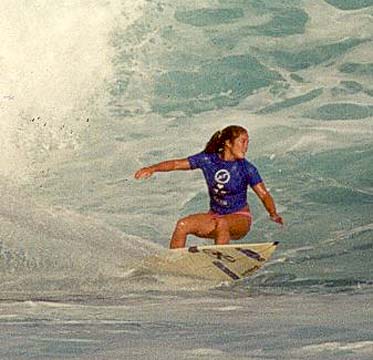
FL MORRIS / FMORRIS@STARBULLETIN.COM
A member of the Koolauloa Surf Club at Kahuku High School, Zack Fonoimoana gets some air at Alii Beach Park.
Against the tide
State rules prohibit
school-sponsored surfing,
but supporters are working
to change that
King Kekaulike High School senior Helena Suehiro is a national high school surfing champion in shortboarding and Maui champion in longboarding.
But you won't read about her accomplishments in the school newspaper, her coach Joanie Wong said. In fact, even though Suehiro competes against other students in local and national events, she can't officially say she's from King Kekaulike or surf for her school.
"Surfing is like a clandestine sport," said surf contest organizer Kim Ball. "It's underground in the land where it was started."
That's because the state Department of Education doesn't recognize surfing as a sport. And fear of lawsuits has led the department to declare that student surfers cannot represent their schools in competitions or use the name of the school or the school logo when they form surf clubs.
"There is no way to reasonably supervise surfing; the risks outweigh the benefits," state public schools Superintendent Patricia Hamamoto wrote in a Nov. 4 memo.
"Students would be out in nature where there is no control over the environment -- conditions of the site, surf height, the unpredictability of waves, sharks, etc. Surfing is a recreational activity that does not have to be done in school," the memo continued.
FL MORRIS / FMORRIS@STARBULLETIN.COM
Koolauloa Surf Club members from Kahuku High School gather at Alii Beach Park. Meme Moody, left, Reis Harney, Ida Leonardi, coach Iris Gonzales, Gina Ahue, Rebecca Fonoimoana and Zack Fonoimoana smile in the sun.
Because of the restrictions, the King Kekaulike students compete as the Upcountry Surf Team.
"It (Hawaii) is the birthplace of surfing. California has surfing as a sport, and how come not Hawaii? I don't get it," Suehiro said.
Proponents have been swimming against a legal current when it comes to getting official recognition for surfing in the schools.
School officials say events in the ocean are especially difficult to manage and that the liability is too great to allow students to surf for their schools.
"With any kind of water-related activities, we've taken a cautious approach," said Lana Mito, the department's education specialist for student activities. "It happens infrequently, but you do have people who break their neck and drown."
But Linda Robb, the former Hawaii director for the National Scholastic Surfing Association, noted that "the NSSA has been nationwide and coast to coast for the last 25 years and never had a single injury, never had an insurance claim." The association sponsors a high school competition in Hawaii and a national high school surfing contest on the mainland.
"If liability were a legitimate issue, then I think football would have been canceled in this state years ago," Robb said.
PHOTO COURTESY RIC LARSEN
King Kekaulike High School senior Helena Suehiro is a national high school surfing champion in shortboarding and Maui champion in longboarding.
Oahu Interscholastic Association Executive Secretary Dwight Toyama countered: "In football you can control the environment. In the ocean there's no control over the environment. You can't control what comes in and out of the area."
Toyama pointed to a shark attack last year when Kauai High School senior Hoku Aki lost his foot in a shark attack while bodyboarding near Brennecke Beach. "Had that been a sanctioned activity, the department would be liable," he said.
Attorney Chris Bouslog, another surfing supporter, disagreed.
He said if participants sign a waiver of liability and if coaches and officials use common sense and take reasonable precautions, the state would be on safe legal ground in the event of a shark attack.
"If it's just one of these random events where something unfortunate happens, it's not the liability of the school or the club," Bouslog said. "Realistically, the number of injuries from surfing is pretty low."
Iris Gonzales, the coach for the Koolauloa Surf Club at Kahuku High School for the last eight years, said practices and competitions are not held in unsafe conditions.
Students participating in surfing also learn about safety and can be taught lifesaving skills.
"They learn all those skills, and they could help friends and other people know what's safe and unsafe," she said.
Gonzales and other surfing supporters argue that surfing helps keep kids interested in school.
"When students belong to a team, whether it be paddling, football ... they learn a lot of good skills, valuable skills that are transferable in life," said James Schlosser, the principal of Kalaheo High School.
The Student Services Committee of the Board of Education will take up the issue of surfing in schools at a meeting this month, said Chairman Sherwood Hara.
"I think it's worthwhile looking at. I'm trying to keep an open mind about what direction we should go with this," he said.
Last month, the board heard from dozens of surfing supporters on Maui who wanted the board to allow surfing as a Maui Interscholastic League sport. The board was impressed with the presentation and wants more information, Hara said.
"Whenever you get into new programs, new areas, I think the board and the department needs to look at it very carefully," he said.
Meanwhile, Suehiro, who hopes to surf for the University of Hawaii this fall, said she plans to be a physical education teacher when she graduates.
"When I get older, I want to coach surfing," she said. "I hope it becomes a sport. That would be cool."


